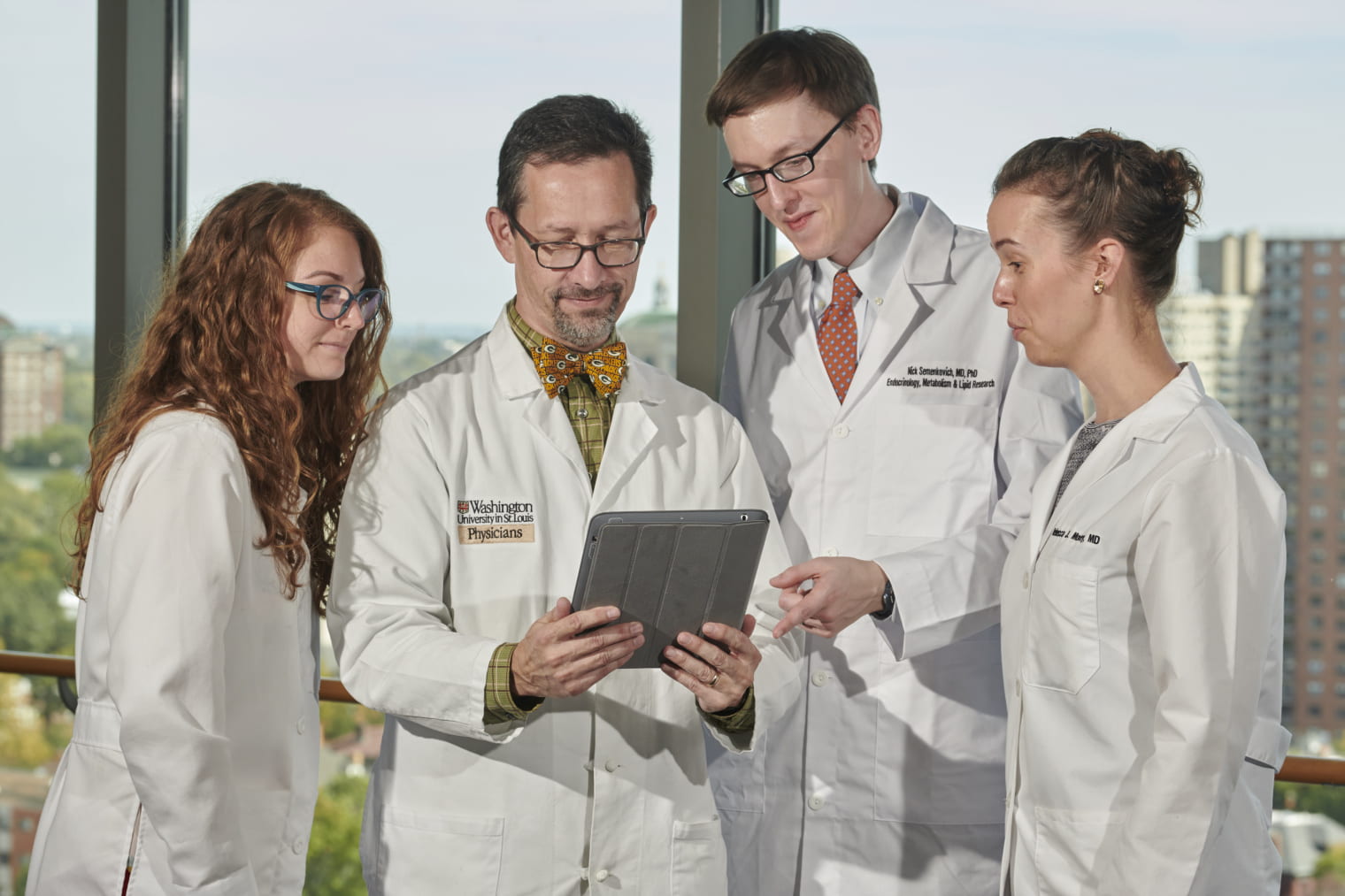History
The long and rich tradition in endocrine-metabolic research at Washington University School of Medicine can be traced to the Nobel Prize-winning work of the late Drs. Carl and Gerti Cori. Among their many trainees who rose to leadership positions in endocrine-metabolic research were Drs. William H. Daughaday and David M. Kipnis, who molded and lead the Metabolism Division, now known as the Division of Endocrinology, Metabolism & Lipid Research, to prominence in the 1950s-1970s. That tradition continues. The current endocrine-metabolic faculty is large (numbering about 50 in the departments of Medicine and Pediatrics alone). Their research and clinical interests are diverse, providing opportunities for broadly based training. See our faculty page for more information.
Training
Up to four new postdoctoral fellows are accepted into the clinical and research fellowship program each year. The fellowship program is supported from diverse sources, including the Division’s NIH-funded training grant. Although the program is based in the Division of Endocrinology, Metabolism & Lipid Research, clinical and research training is provided by faculty from the entire Metabolism Group, and in some instances, from faculty in other divisions and departments of the School of Medicine. The number of strictly research fellows varies.
Perhaps best known for research training, our Program consistently ranks among the top 10 in the nation.

About St. Louis
St. Louis is a hub for international research and a destination for patients seeking exceptional care.
Research activities are organized vertically, albeit with substantial collaboration within the Endocrinology, Metabolism & Lipid Research group and with faculty in other clinical and pre-clinical departments. Clinical training is organized horizontally. Fellows gain clinical experience through inpatient consultations in Barnes-Jewish Hospital (about 1000 beds), a diabetes program, and general outpatient clinics in the Division of Endocrinology, Metabolism & Lipid Research, and in the clinics of the Division of Bone & Mineral Metabolism, the Division of Endocrinology & Metabolism in the Department of Pediatrics and the Reproductive Endocrinology clinic in the Department of Obstetrics & Gynecology. The Center for Human Nutrition provides a rich environment for young investigators, as well as established investigators who are expanding into new areas. Clinical and research conferences are also organized across these groups.
The research and clinical experiences are supported further by the Diabetes Research Center (DRC) and the Institute of Clinical and Translational Sciences (ICTS.) These multi-disciplinary centers are directed and utilized extensively by faculty of the Division of Endocrinology, Metabolism & Lipid Research. The DRC directed by Clay F. Semenkovich, MD includes clinical research, radioimmunoassay, mass spectroscopy, morphology, tissue culture, human islet and molecular biology cores, as well as a research-oriented behavioral/educational component. The ICTS, one of the oldest in the nation, provides inpatient and outpatient research space, research nurses and dietitians, a core laboratory, and a computer system with an array of software. The Mass Spectrometry Resource directed by Michael Ben Major, PhD provides additional research support.

In general, clinical training is distributed over the first two years of the fellowship. Thus, fellows become active in research training from the beginning. To complete research training, we consider a third (and in some instances a fourth) year of fellowship fundamentally important.
Clinical training includes inpatient and outpatient consultations. The inpatient consultation team fellow, resident(s), student(s), and consultant sees patients in Barnes-Jewish Hospital. Outpatient rotations include experiences in general endocrinology, metabolism and diabetes consultation office with individual faculty members, fellows continuity clinic and VA endocrinology and metabolism clinic as well as pediatric endocrinology and metabolism, bone health, lipid disorders, reproductive endocrinology and thyroid.
The Programs primary source of support is a National Institutes of Health Institutional National Research Service Award (Training Grant), now in its 46th year of funding. This training program is one of the oldest and most successful NIH funded programs in the country. Washington University provides a course in Responsible Conduct of Research (RCR),which is a requirement of the training program for all of our clinical and research training fellows. Only United States citizens or permanent residents are eligible for support from the Training Grant. However, other sources of support may be sought for highly qualified citizens of other countries.
Stipends
Stipends are determined by years of training after M.D. or Ph.D. degree in accordance with National Institutes of Health Guidelines. These are supplemented to match postdoctoral levels at Washington University.
To Apply
We will be accepting applications through the Electronic Residency Application Service (ERAS). When you register through ERAS be sure to include three letters of recommendation. One letter should be from the Chief of your clinical service or your thesis advisor. If you have had prior research experience, a letter from your former mentor is requested. A copy of your Deans letter of recommendation for internship would be helpful.
Those individuals qualifying for our training program on the basis of academic accomplishment and proven clinical skills will be interviewed. The period of training is for not less than two years. Three years are strongly recommended. Appointments are generally made a year in advance.